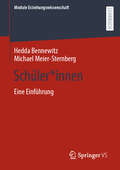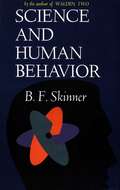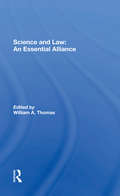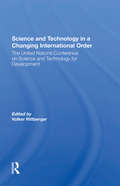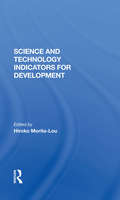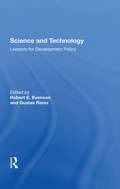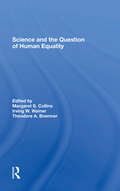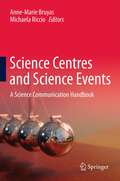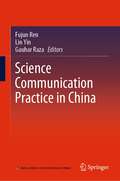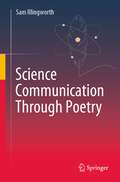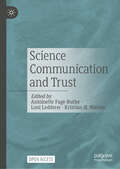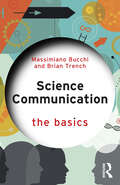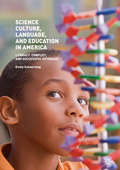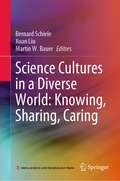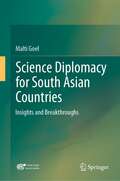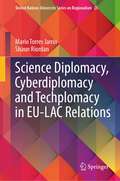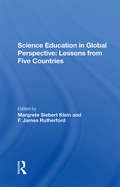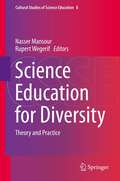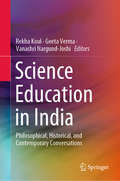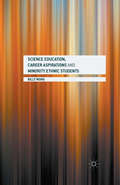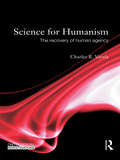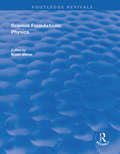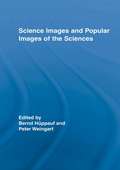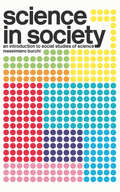- Table View
- List View
Schüler*innen: Eine Einführung (Module Erziehungswissenschaft #3)
by Hedda Bennewitz Michael Meier-SternbergIn dieser Einführung werden wichtige theoretische Perspektiven zur Beschreibung von Schüler*innen verständlich vorgestellt und systematisch unter den Schwerpunkten soziale Konstruktion von Schüler*innen, Leistung und Peerkultur diskutiert. Das Buch ist als Übersicht konzipiert und vermittelt ein grundlegendes Wissen über die Lebenswelt und das Handeln von Schüler*innen.
Science And Human Behavior
by B. F SkinnerThe psychology classic--a detailed study of scientific theories of human nature and the possible ways in which human behavior can be predicted and controlled--from one of the most influential behaviorists of the twentieth century and the author of Walden Two."This is an important book, exceptionally well written, and logically consistent with the basic premise of the unitary nature of science. Many students of society and culture would take violent issue with most of the things that Skinner has to say, but even those who disagree most will find this a stimulating book." --Samuel M. Strong, The American Journal of Sociology"This is a remarkable book--remarkable in that it presents a strong, consistent, and all but exhaustive case for a natural science of human behavior...It ought to be...valuable for those whose preferences lie with, as well as those whose preferences stand against, a behavioristic approach to human activity." --Harry Prosch, Ethics
Science And Human Behavior
by B. F SkinnerThe psychology classic--a detailed study of scientific theories of human nature and the possible ways in which human behavior can be predicted and controlled--from one of the most influential behaviorists of the twentieth century and the author of Walden Two."This is an important book, exceptionally well written, and logically consistent with the basic premise of the unitary nature of science. Many students of society and culture would take violent issue with most of the things that Skinner has to say, but even those who disagree most will find this a stimulating book." --Samuel M. Strong, The American Journal of Sociology"This is a remarkable book--remarkable in that it presents a strong, consistent, and all but exhaustive case for a natural science of human behavior...It ought to be...valuable for those whose preferences lie with, as well as those whose preferences stand against, a behavioristic approach to human activity." --Harry Prosch, Ethics
Science And Law: An Essential Alliance
by William A ThomasLaw and science are pervasive in society, and we depend upon their fruitful collaboration to promote stability and progress. The substance and procedures of law guide our judicial, legislative, and administrative systems. Science and technology stimulate our imagination and contribute to the production and distribution of virtually all goods and services. The need for scientists and lawyers to understand the strengths and limitations of each other's profession has never been more apparent.
Science And Technology In A Changing International Order: The United Nations Conference On Science And Technology For Development
by Volker RittbergerAs part of its contribution to the 1979 United Nations Conference on Science and Technology for Development IUNCSTD) the United Nations Institute for Training and Research jUNITAR) organized an informal research group to assess various aspects of applying science and technology to development through the United Nations system. This research group was constituted in early 1978 at the initiative of Dr. Robert S. Jordan, former Director of Research at UNITAR, and was headed by Professor Volker Rittberger, a UNITAR Special Fellow. One of the activities of this group has been the production of a series of working papers on science and technology. These papers seek to provide preliminary analyses rather than definitive conclusions. Their purpose is to facilitate the access of others to the ongoing work of the group and to stimulate critical comments and reactions leading to further improvement of this work.
Science And Technology Indicators For Development
by Hiroko Morita-louThe current indicators used to measure the impact of science and technology in developing countries have been formulated based on conditions and assumptions that are primarily relevant to developed countries. The contributors to this volume contend that these indicators, when applied to developing countries, often lead to inaccurate conclusions. An
Science And Technology: Lessons For Development Policy
by Gustav Ranis Robert EvensonThis book presents several general theoretical notions about the process of science and technology as it relates to development. It develops the international dimension of science and technology in terms of the international exchange processes and the appropriateness and modification of technology.
Science And The Question Of Human Equality
by Margaret S Collins Irving W Wainer Theodore A. BremnerThis book provides an interdisciplinary look at racism and science, investigating the biological and social realities of individual and group differences. The contributors examine race and racial distinctions, environmental versus genetic contributions to IQ and to cognitive skill level, the impact of biocultural interactions on behavior, and the problems of achieving an objective appraisal of inter- and intragroup differences in humans. They also consider a possible model for cultural and biological evolution, recommending a careful selection of models and methods of approach for sciences concerned with the study of man. The book includes recent findings in the area of race and IQ, documents instances of racism and classism, and analyzes factors underlying these phenomena.
Science Centres and Science Events
by Anne-Marie Bruyas Michaela RiccioThe idea for this text stemmed from the fruitful experience gathered during the training course of 9 Nigerian university students organized in Naples from 3 to 18 September 2008 by the team of Fondazione IDIS-Città della Scienza under the project Science Centre Owerri. The training course turned out to be not only an educational opportunity to acquire knowledge and skills for these students, but also a real and practical tool that later led to the realization of the first Science Festival of Owerri in Nigeria in May 2009. This in turn sparked the idea of creating a highly practical handbook for those who want to face the challenge of developing new projects for the dissemination and socialization of science in developing countries. In these countries, the role of scientific education and training in schools is not sufficient to arouse scientific curiosity among young people and make the population aware of the importance of scientific knowledge in everyday life. Moreover science and technology are indispensable tools for people's empowerment and should be supported with actions that encourage curiosity about science and the intelligent use of technology to bridge the divide with developed countries. It is therefore necessary to set up activities that are carefully targeted to promote and communicate science. The text has been designed as a practical guide to be used in a variety of contexts: scientific events or more structured science festivals, training, the creation of scientific cultural associations, and the development of new science centres. Besides being an excellent tool for training and supporting the design and planning phases, the manual can also be used as a reference work for institutions and local cultural services which have to select projects of this type.
Science Communication Practice in China
by Fujun Ren Lin Yin Gauhar RazaChina has made remarkable and rapid progress in the area of science communication, both in theory and practice. This book critically examines all aspects of science communication practices in China. Dealing with major turning points since the introduction of the ‘Science and Technology Popularization Law’ and the ‘Outline of the National Scheme for Scientific Literacy’, the book tells a success story by scrutinizing structural changes in science communication policies, education system, construction and efficacious utilisation of science popularisation facilities, and creative use of a mix of traditional and modern channels of communication. The book also gives an in-depth analysis of the monitoring and evaluation mechanism, which constitutes the backbone of the national science communication project. The historical roots of science communication in China include shifts in methodologies, policy instruments, effectual approaches and resultant practices since the days of initial efforts to popularise modern scientific ideas. However, the primary focus of the book remains on the initiatives launched at the turn of the present century. Without losing sight of the national dimensions, each chapter of the book draws from provincial as well as grassroots level experiences. Quantitative and qualitative methods have been used to analyse strengths, weaknesses, hurdles and the efficacy of corrective measures. This book offers a remarkable insight to anyone who is interested in probing the causal relationship between science communication and China’s transformation into a modern society. The primary objective of the book is to analyse the nature of ‘science communication with Chinese characteristics’ and the specificity of the socio-cultural environment in which Science and Technology is located. Though the book is of particular interest to scholars, researchers, students and practitioners of science communication, the narrative style makes it accessible to the general reader who is interested in science-society relationship.
Science Communication Through Poetry
by Sam IllingworthScience Communication Through Poetry aims to explore how we might communicate science effectively both to and with non-scientific audiences across the spectrum of science communication, from dissemination to dialogue, via the medium of poetry. It has been written for scientists, science communicators, public engagement practitioners, and poets, so that they can learn how to use poetry as an effective tool through which to diversify science. As well as containing specific advice and guidance for how to use poetry to communicate science with different audiences, this book contains a number of exercises for the reader to reflect on what has been learnt and to put into practice what is discussed. Further study and additional readings are also provided to help improve knowledge, understanding, and familiarity with both poetry and science communication.
Science Communication and Trust
by Antoinette Fage-Butler Loni Ledderer Kristian H. NielsenThis open access book presents groundbreaking research, offering new empirical findings, showcasing a range of different methods, and advancing theoretical perspectives relating to science communication and trust. The investigation of science communication and trust is enhanced by the many international scholars and disciplinary approaches featured. The book includes three thematic sections: the first focuses on the role of trustworthy science communicators, the second is concerned with the varying contexts of science communication for trust, while the third unpacks various features of trust in science. The volume thus provides the reader with invaluable insights into the highly salient topic of science communication and trust.
Science Communication: The Basics (The Basics)
by Massimiano Bucchi Brian TrenchScience Communication: The Basics is an accessible yet critical introduction to science communication, which is viewed as the social conversation around science. It addresses why science communication matters, examines the evolution of theories and practices and explains concepts, myths, misunderstandings and challenges.Massimiano Bucchi and Brian Trench navigate the foundations and key themes of science communication through numerous vignettes, examples, cases and arguments. They provide annotated recommended reading and a Lexicon summarising the understandings and uses of key terms in the field. Revealing science communication as a collective process and part of daily life, topics covered include science communication as part of culture and our understanding of ourselves and the world; the history of science communication and the development of ‘modern science’; policy and theoretical approaches; the growth of professional practice, formal education and research in the field; evolving platforms for science communication; and quality, trust and ethical awareness in science communication.Science Communication: The Basics is designed to be a concise primer and essential reading for newcomers to the field, including staff in research and policy institutions, students of the natural, human and social sciences, and general readers curious about the ways science is presented and perceived in society.Science Communication: The Basics is the third in a triptych of works on science communication from the two authors. The other two works are the Routledge Handbook of Public Communication of Science and Technology, first published in 2008 and now in its third edition (2021), and a four-volume anthology of readings, The Public Communication of Science (2016), also published by Routledge.
Science Culture, Language, and Education in America: Literacy, Conflict, And Successful Outreach
by Emily SchoerningCan the culture and language of science be an alienating force that discourages marginalized people from identifying with scientists and pursuing higher education in the sciences? More broadly, does an education system which unwittingly presents science as a distinct culture result in a population susceptible to doubt, confusion, and denial? This volume explores how this 'culture of science' is reflected and transmitted in the classroom, and how this can have wide-reaching and often negative implications for science education and science literacy. Well-intentioned efforts to bring hands-on scientific experiences into the classroom must also take into account how students perceive the culture of science. Areas of potential conflict include linguistic and cultural behaviors, misconceptions about science and the nature of science, and, in some cases, religious worldviews. Once recognized, these conflicts are resolvable, and valid methods exist to reduce alienation, broaden participation, and ensure that all students, whether or not they pursue STEM careers, leave school knowing that science is something that they can trust.
Science Cultures in a Diverse World: Knowing, Sharing, Caring
by Xuan Liu Bernard Schiele Martin W. BauerScience and technology culture is now more than ever at the very heart of the social project, and all countries, to varying degrees, participate in it: raising scientific literacy, improving the image of the sciences, involving the public in debates and encouraging the young to pursue careers in the sciences. Thus, the very destiny of any society is now entwined with its ability to develop a genuine science and technology culture, accessible for participation not only to the few who, by virtue of their training or trade, work in the science and technology fields, but to all, thereby creating occasions for society to debate and to foster a positive dialogue about the directions of change and future choices.This book organized on the theme of ‘knowing, sharing, caring: new insights for a diverse world’, which was derived from the observation that globalization rests upon diversity—diversity of contexts, publics, research, strategies and new innovating practices—and aims to stimulate exchanges, discussions and debates, to initiate a reflection conducive to decentring and to be an opportunity for enrichment by providing the reader with means to achieve the potentialities of that diversity through a comparison of the visions that underpin the attitudes of social actors, the challenges they perceive and the potential solutions they consider.Thus, this book aims first and foremost to raise questions in such a manner that readers so stimulated will feel compelled to contribute and will do so. In this spirit, however significant, the results presented and shared are less important than the questions they seek to answer: How are we to rethink the diffusion, the propagation and the sharing of scientific thought and knowledge in an ever more complex and diverse world? What to know? What to share? How do we do it when science is broken down across the whole spectrum of the world’s diversity?The book is recommended for those who are interested in science communication and science cultures in the new media era, in contemporary social dynamics, and in the evolution of the role of the state and of institutions. It is also an excellent reference for researchers engaging in science communication, public understanding of science, cultural studies, science and technology museum, science–society relationship and other fields of humanities and social sciences.
Science Diplomacy for South Asian Countries: Insights and Breakthroughs
by Malti GoelThis book provides a science diplomacy outlook as a new governance tool in international cooperation. It elaborates on India's current S&T collaboration with Afghanistan, Bangladesh, Bhutan, Maldives, Myanmar, Nepal, Pakistan, Sri Lanka, and science policy and science diplomacy in India. The book introduces concepts and contours of science diplomacy with international examples. It presents insights into international governance models, mega-science projects, and science diplomacy's role in addressing global climate change and sustainable development challenges. The book is a valuable reference to spark breakthroughs in India’s science diplomacy with its neighbouring countries for scientists, diplomats, policymakers, government, and non-government institutions interested in science and diplomacy.
Science Diplomacy, Cyberdiplomacy and Techplomacy in EU-LAC Relations (United Nations University Series on Regionalism #25)
by Shaun Riordan Mario Torres JarrínThis book explores collaborations between the European Union (EU) and the CELAC ( Community of Latin American and Caribbean States) in science diplomacy, as well as the related areas of cyberdiplomacy and techplomacy. It focuses on how interregional collaboration could strengthen societal resilience in both LAC and EU member countries and contribute to realising the SDGs and Agenda 2030 objectives. The book explores the history of EU relations with LAC, and provides a conceptual basis for science diplomacy, including cyberdiplomacy and techplomacy in the context of international relations and diplomacy studies. It highlights how COVID-19 has accelerated pre-existing trends in diplomacy in EU and LAC, forcing diplomats online and making them confront scientific and technical issues as core parts of foreign policy agendas and future pandemic preparedness. The book also examines the role of science diplomacy between these regions in relation to the climate change debate and reflects on whether the EU-LAC collaboration in science and R&D can be taken to a policy level. It provides suggestions on ways in which the CELAC and the EU could collaborate, both in promoting a ruled-based cyberspace and in strengthening digital resilience, and situates this collaboration in the broader geopolitical, scientific and technological environments. Authored by experts in this field, this highly topical book is of interest to a wide readership interested in diplomacy studies, public policy, international relations, regionalism, and S&T studies.
Science Education In Global Perspective: Lessons From Five Countries
by Margrete Siebert Klein F. James Rutherford F James Rutherford Margrete S. KleinThe decline in the quality of American public school instruction, particularly in science and mathematics, is a well-documented subject of concern for our nation. This book examines the educational systems in Japan, the People's Republic of China, East and West Germany, and the Soviet Union, countries that have developed particularly innovative app
Science Education for Diversity: Theory and Practice
by Rupert Wegerif Nasser MansourReflecting the very latest theory on diversity issues in science education, including new dialogic approaches, this volume explores the subject from a range of perspectives and draws on studies from around the world. The work discusses fundamental topics such as how we conceptualize diversity as well as examining the ways in which heterogeneous cultural constructs influence the teaching and learning of science in a range of contexts. Including numerous strategies ready for adoption by interested teachers, the book addresses the varied cultural factors that influence engagement with science education. It seeks answers to the question of why increasing numbers of students fail to connect with science education in schools and looks at the more subtle impact that students' individually constructed identities have on the teaching and learning of science. Recognizing the diversity of its audience, the book covers differing levels and science subjects, and examines material from a range of viewpoints that include pedagogy, curricula, teacher education, learning, gender, religion, and ICT, as well as those of in-service and trainee teachers at all levels.
Science Education in India: Philosophical, Historical, and Contemporary Conversations
by Rekha Koul Geeta Verma Vanashri Nargund-JoshiThis book brings researchers from across the world to share their expertise, experience, research and reflections on science education in India to make the trends and innovations visible. The thematic parts of the book discuss science education: overviews across K-16 levels; inclusivity and access for underrepresented and marginalized sections; use of innovations including technology in the teaching; and implications for research, practice, innovation and creativity. The book should be of special interest to researchers, school administrators, curriculum designers and policymakers.A timely compilation for current and future generations of academic researchers, teachers and policymakers who are interested in examining the issues facing one of the largest education systems in the world. The book offers unique insights into contemporary topics such as girls in STEM subjects, curriculum reform and developing a generation of future creative thinkers. -Professor Vaille Dawson, The University of Western Australia, Australia.It provides a panorama of challenges in a country of more than 1.3 billion people, 50% being below the age of 25 years. The book arrives at a time in which there are discouraging trends, including a decrease in funding for education. The book chapters are centred on issues that warrant debate to foster awareness of the roles of science education in India and priorities and possibilities for expanding horizons on the road ahead. -Professor Kenneth Tobin, The City University of New York, New York, USA.
Science Education, Career Aspirations and Minority Ethnic Students
by Billy WongIs science typically for White men? Is science for 'people like us'? What are the barriers and opportunities? This book explores the science career aspirations of minority ethnic students. It investigates the views, experiences and identities of British Black Caribbean, Bangladeshi, Chinese, Indian and Pakistani youths in relation to science.
Science For Humanism: The Recovery of Human Agency
by Charles R. VarelaIn the 18th century, the pre-modern Judeo-Greco-Christian problem of freedom and determinism is transformed by Kant into the modern problem of the freedom of human agency in the natural and cultural worlds of deterministic structures; it is this version of the freedom and determinism issue which centres the Science and Humanism debates, and thus marks the history of the social sciences. Anthony Giddens is credited with providing the new vocabulary of ‘structure’ and ‘agency’ in order to formulate the problem of freedom and determinism in those terms, thus making this formulation fruitful. In this book, Charles R. Varela proposes that Kant originally formulated this problem, and makes a series of wide-ranging and groundbreaking observations based on Kant's metaphysics of realism which enables Varela to propose a solution to the structure/agency problem. Subjects revisited in this book include: · "Giddens’ Call" · The stalemate of the social and psychological sciences · The determinist tradition of modern science · Postmodernism This breadth of themes, drawn together by Varela with his work on Kant, fully realizes Giddens’ principle that human agency is a real causal force. It is Kant's conception of causal power that is the causal force Giddens' has called for. Science For Humanism: The Recovery of Human Agency will be of particular interest to students of humanism and therefore realism, Kant and Giddens.
Science Foundations: Physics Supplementary Materials (Science Foundations Ser.)
by Bryan MilnerThis title was first published in 2001. The new edition of Science Foundations provides comprehensive coverage of single- and double-award GCSE science. It is fully revised and updated to match the new GCSE specifications, for teaching from September 2001. It contains all the material required for the foundation and higher tiers, with clear progression and explicit differentiation. 'Higher tier only' material is clearly marked in separate spreads. The language level is carefully controlled, with illustrations and layout specifically designed to make the concepts accessible. There are frequent opportunities for students to confirm their understanding of each key idea as it is introduced, via short questions and summary passages on each spread. The books include guidance for students on how to prepare for and answer their GCSE examinations, and a glossary of key words for ease of reference.
Science Images and Popular Images of the Sciences (Routledge Studies in Science, Technology and Society #Vol. 8)
by Peter Weingart Bernd HüppaufWhat is a popular image of science and where does it come from? Little is known about the formation of science images and their transformation into popular images of science. In this anthology, contributions from two areas of expertise: image theory and history and the sociology of the sciences, explore techniques of constructing science images and transforming them into highly ambivalent images that represent the sciences. The essays, most of them with illustrations, present evidence that popular images of the sciences are based upon abstract theories rather than facts, and, equally, images of scientists are stimulated by imagination rather than historical knowledge.
Science In Society: An Introduction to Social Studies of Science
by Massimiano BucchiThe world around us is continually being shaped by science, and by society’s relationship to it. In recent years sociologists have been increasingly preoccupied with the latter, and now in this fascinating book, Massimiano Bucchi provides a brief introduction to this topical issue. Bucchi provides clear and unassuming summaries of all the major theoretical positions within the sociology of science, illustrated with many fascinating examples. Theories covered include Thomas Kuhn's theory of scientific change, the sociology of scientific knowledge, actor-network theory, and the social construction of technology. The second half of the book looks at recent public controversies over the role of science in the modern world including:* the Sokal affair, otherwise known as the science wars* debates over public understanding of science, such as global warming and genetically modified food* the implications of the human genome project. This much needed introduction to a rapidly growing area brings theory alive and will be essential reading for all students of the sociology of science.
